On November 5, 2013, Michigan Governor Rick Snyder signed into law Public Acts 155, 156 and 157 of 2013 giving a legal guardian the power to execute a Do-Not-Resuscitate (DNR) order on behalf of the guardian’s ward. The Acts amend the Michigan Do-Not-Resuscitate Procedures Act (enacted in 1996), the Adult Foster Care Licensing Act (enacted in 1979), and the Estate and Protected Individual’s Code (enacted in 1998). The amendments took effect on February 5, 2014 and authorize new guardianship power in Michigan.[1]
 Prior to the amendments, Michigan courts have disagreed as to whether a guardian could consent to a DNR order for the ward. The legislature has now permitted it. However, the new amendments only apply to the withholding of resuscitative measures from a person who is in a facility or residence other than a hospital (e.g., a nursing home, home for the aged, adult foster care facility, assisted living, hospice residence, or the ward’s private residence). DNR orders and measures in a hospital are not subject to this new law, and a guardian has already authority (if within the guardian’s powers as provided by the court) to consent to a physician’s order to withhold resuscitative measures in a hospital.
Prior to the amendments, Michigan courts have disagreed as to whether a guardian could consent to a DNR order for the ward. The legislature has now permitted it. However, the new amendments only apply to the withholding of resuscitative measures from a person who is in a facility or residence other than a hospital (e.g., a nursing home, home for the aged, adult foster care facility, assisted living, hospice residence, or the ward’s private residence). DNR orders and measures in a hospital are not subject to this new law, and a guardian has already authority (if within the guardian’s powers as provided by the court) to consent to a physician’s order to withhold resuscitative measures in a hospital.
New Powers
The amendments provide the guardian with the following powers:
- A legal guardian now has the power to execute a DNR order for the guardian’s ward, as if the ward could do so himself or herself.
- Once the DNR order is executed, the guardian may apply a DNR bracelet to the ward’s wrist.
- The guardian may revoke the DNR order at any time by voiding the DNR order in writing and by notifying the attending physician and the administrator of any facility in which the ward resides.
Conditions and Restrictions
The amendments incorporate certain safeguards to the new DNR powers:
- In all new guardianship cases, the guardian ad litem assigned to each guardianship case must discuss the DNR issue with the proposed ward and incorporate the findings into the guardian ad litem’s report to the court.
- A guardian must visit the ward within 14 days before the guardian can legally execute a DNR order on behalf of the ward, and the guardian must attempt to discuss the DNR order with the ward if meaningful communication with the ward is possible
- The guardian must also personally consult with the ward’s attending physician regarding the basis for the DNR order.
- The guardian must provide a copy of the DNR order to the ward’s attending physician and to the administrator of the facility in which the ward resides or the order must be available in the private residence if the ward ward resides at home.
- The DNR order is only valid for one year, at which time it may be reaffirmed (extended) but only after the guardian visits the ward and discusses with the ward’s attending physician.
- Any interested person (as legally defined in the guardianship case) may petition the court for review of a DNR order to determine its validity if there is a question as to whether the DNR was properly executed by the guardian.
In every guardianship petition that is filed, the court should already be making a determination on whether a legal guardian is to receive the DNR power in the specific case. The court must grant the guardian the authority over consent to a DNR order both in the court order of guardianship and the letters of guardianship given to the guardian. This is accomplished by specifically referencing the power or by not excluding the power from the general powers granted. Consistent with guardianship proceedings in general, the DNR power given to a guardian must be in the ward’s “best interest” as determined from the facts of the case, the medical opinion of the ward’s physician, and the ward’s wishes.
Specific Form Required
The DNR order itself must be in writing and in a form that is “substantially” similar to the form language provided as an example in the statue. Generally, unless consulting with an attorney, it is best to use the statutory form in its entirety and without changes. There is an alternate form for individuals who have religious beliefs against using doctors. Copies of the statutory form are usually available at hospitals or through hospice providers, although a qualified attorney can prepare the document as part of a personalized estate plan.
Better Care or Too Much Power?
These new DNR amendments will enable hospice providers and physicians to provide better care to those with terminal conditions who are under the care of a guardian and who are outside of the hospital setting . However, this represents a new level of power (and responsibility) for guardians in Michigan and could be subject to misuse. As with all laws, only time will tell of the law’s practical application and effect. GJR
Notes
- See generally MCL 333.1053a and MCR 700.5314.

